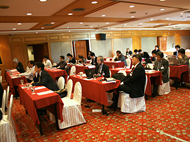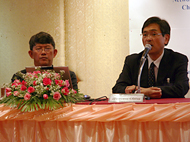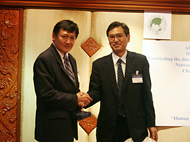Events
AIT-KU Joint Symposium on Human Security Engineering - Establishing the Discipline of Human Security and Broadening a Network for Human Security in Asian Megacities -
Date: November 19 - 20, 2009
Venue: Chaophya Park Hotel, Bangkok, Thailand
Organized by:
- Asian Institute of Technology (Thailand)
- Kyoto University (Japan)
- Kyoto University Global COE Program "Global Center for Education and Research on Human Security Engineering for Asian Megacities"
Number of attendants: about 100
Report 049
Outline
On November 19 and 20, 2009, "AIT-KU Joint Symposium on Human Security Engineering -Establishing the Discipline of Human Security and Broadening a Network for Human Security in Asian Megacities-" was held at Chaophya Park Hotel, Bangkok, Thailand. Human Security Engineering consists of four research fields, "Urban Governance," "Urban Infrastructure Management," "Environmental Risk Management," and "Disaster Risk Management." Those who engage in activities in these research fields participated in the symposium. The purpose of the symposium was to establish the discipline of Human Security Engineering and to broad a network for human security in Asian megacities.
Theme:
Establishing the discipline of Human Security Engineering and Broadening a Network for Human Security in Asian Megacities
Venue:
Chaophya Park Hotel, Bangkok, Thailand
Date:
November 19-20, 2009
Organized by:
- Asian Institute of Technology
- Kyoto University
- Kyoto University Global COE Program "Human Security Engineering for Asian Megacities"
BACKGROUND AND SCOPE:
Fulfilling basic human needs and assuring the self-sustainable recovery from environmental pollution and disasters in Asian Megacities have been the major challenges for several decades, and the situation still needs more improvement. Against such a background, Kyoto University has launched a new Global Center Of Excellence (GCOE) Program entitled "Global Center for Education and Research on Human Security Engineering for Asian Megacities" since 2008 fiscal year. The purpose of this GCOE program is to establish the discipline of "Urban Human Security Engineering" and to provide education for next-generation researchers and high-level practitioners for human security in Asia. One of the characteristics of this GCOE program is to implement area-specific research and education. The program set up 6 overseas bases and Asian Institute of Technology (AIT) in Bangkok is one of the overseas bases. The symposium aims to deepen the understanding of urban human security engineering and develop its policy and implementation by strengthening a broad range of network between not only Thailand and Japan but also other Asian countries.
URBAN HUMAN SECURITY ENGINEERING:
"Urban Human Security Engineering" is defined as a system of technologies (techniques) for designing and managing cities that enable their inhabitants to live under better public health conditions, and also live free from potential threats of large-scale disasters and environmental destruction. For establishing this discipline, four existing fields, i.e. urban governance, urban infrastructure management, health risk management, and disaster risk management, are integrated into one discipline. The program of the symposium will include four research fields which Human Security Engineering consists of.
OBJECTIVES:
Key objectives of the conference are:
-To discuss the new discipline of Human Security Engineering
-To broad a network for human security among not only Thailand and Japan, but also the other Asian Megacities
-To promote interaction between researchers and practitioners
Topics of interest in this AIT-KU Joint Symposium includes (but not limited to):
1. Urban Governance
2. Urban Infrastructure Asset Management
3. Environmental Accounting of Infrastructure Project
4. Urban Energy Security Engineering
5. Urban Food Security Engineering
6. Urban Transport and Logistics
7. Urban Disaster Prevention
WHO SHOULD ATTEND THE CONFERENCE?
We are pleased to welcome all of researches, practitioners, and students who are interested in Human Security Engineering.
LANGUAGE:
The official language of the conference is English.
ORGANISING BODIES:
The conference is jointly organized by the Asian Institute of Technology, Thailand, the Faculty of Engineering, Kyoto University, Japan and Global COE "Human Security Engineering for Asian Megacities".
ASIAN INSTITUTE OF TECHNOLOGY promotes technological change and sustainable development in the Asian-Pacific region through higher education, research and outreach. Established in Bangkok in 1959, AIT has become a leading regional postgraduate institution and is actively working with public and private sector partners throughout the region and with some of the top universities in the world.
KYOTO UNIVERSITY was founded in 1897, the second university to be established in Japan. Known for its pioneering spirits and academic freedom, the university has produced five Nobel laureates and two Fields medalists.
Global COE(Centers of Excellence) Program, which has been carried out by Japan's Ministry of Education, Culture, Sports, Science and Technology (MEXT) , will provide funding support for establishing education and research centers that perform at the apex of global excellence to elevate the international competitiveness of the Japanese universities. The program will strengthen and enhance the education and research functions of graduate schools, to foster highly creative young researchers who will go on to become world leaders in their respective fields through experiencing and practicing research of the highest world standard.
CONFERENCE VENUE:
Chaophya Park Hotel, 247 Rachadapisek Road, Dindaeng, Bangkok 10400, Thailand
Tel : (+66) 2290-0125
Fax : (+66) 2290-0167-68
Email : info@chaophyapark.com
CONFERENCE GOVERNORS:
ADVISORY BOARD:
COMMITTEE MEMBER
Yuzo Ohnishi (Kyoto University)
Vilas Wuwongse (AIT)
Yuzuru Matsuoka (Kyoto University)
ORGANIZING COMMITTEE
COMMITTEE MEMBER
Prof. Hiroyasu Ohtsu (Kyoto University)
Prof. Noppadol Phienwej (AIT)
PROGRAM COMMITTEE
CO CHAIRMAN
Prof. Kiyoshi Kobayashi (Kyoto University)
Assoc.Prof. Pennung Warnitchai (AIT)
COMMITTEE MEMBER
Prof. Eiichi Taniguchi (Kyoto University)
Prof. Toshifumi Matsuoka (Kyoto University)
Prof. Kiyoshi Kobayashi (Kyoto University)
Prof. Kunitomo Sugiura (Kyoto University)
Prof. Hitoshi Gotoh (Kyoto University)
Assoc. Prof. Yasuto Tachikawwa (Kyoto University)
Prof. Noppadol Phienwej (AIT)
Prof. Suttisak Soralump (Kasetsart University)
Assoc. Prof. Mukand S. Babel (AIT)
Assist. Prof. Pham Huy Giao (AIT)
Dr. Lal Samarakoon (AIT)
KEYNOTE SPEAKERS
Kenichi SOGA (Prof., Cambridge, University)
TBA (Asian Institute of Technology)
REGISTRATION (registration fee):
Please send your name and affiliation to Dr.Mamoru Yoshida, who is the general secretaliat of this conference, by November 12th, 2009. All participants are free to attend the conference.
GENERAL SECRETARIAT CONTACT DETAILS:
Dr. Mamoru Yoshida, Kyoto University, Japan
E-mail: yoshida@hse.gcoe.kyoto-u.ac.jp
Phone: +81-75-383-3224
Fax: +81-75-383-3224
LOCAL SECRETARIAT CONTACT DETAILS: (TBA)
Report
In the opening address, Prof. Ohtsu, the overseas base leader in Bangkok, mentioned our trial and future purposes of this GCOE program. Prof. Noppadol, who is in charge of Bangkok office, also delivered his speech about activities based on Bangkok overseas base and future aspiration toward the development of Human Security Engineering.
In the special lecture by Prof. Soga, he addressed not only infrastructure planning and management considering sustainability, but also case examples in the United Kingdom. In addition, Mr. Oravit Haemjutha, a director of Traffic Engineering Office Traffic and Transportation Department in Bangkok Metropolitan Administration, gave another lecture on the current status of infrastructures in Bangkok, and practical activities related to disaster prevention and environmental management.
After the special lectures, we set up eight sessions in which detailed research themes were presented, and the participants had lots of interdisciplinary discussions over human security issues.
Since we invited speakers from not only Thailand and Japan but also from Singapore, Malaysia and Indonesia, we could share the current problems related to infrastructures in each country, and exchange opinions on human security issues. We had more than a hundred participants, and the symposium made a huge contribution to the formation of human and research networks in Asian megacities.



